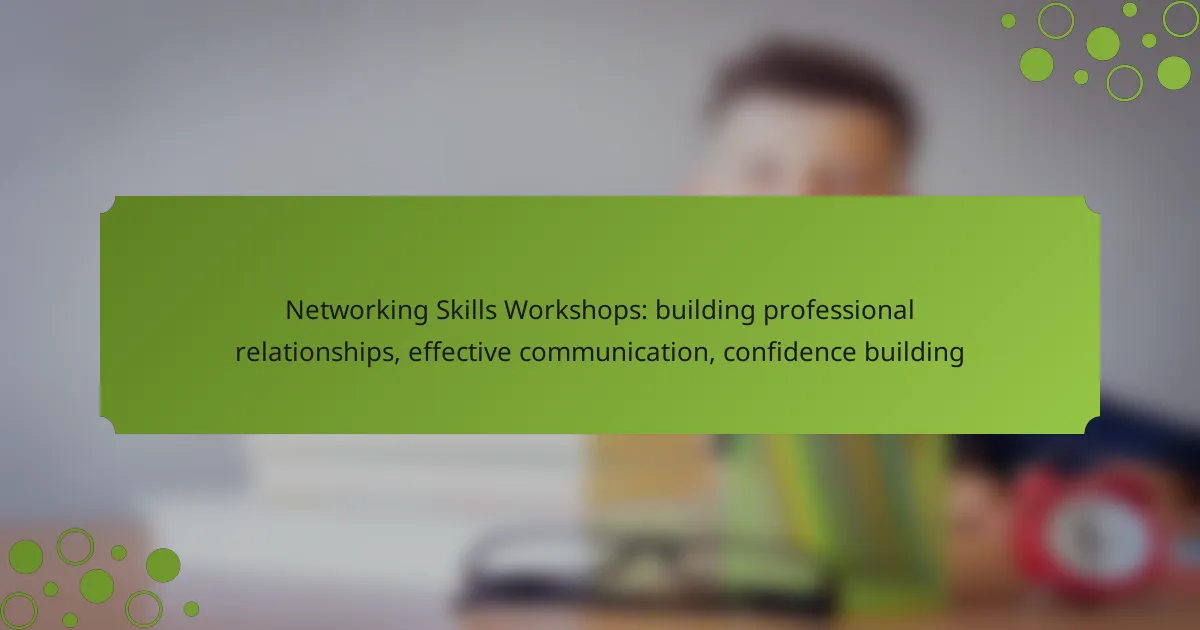
Networking skills workshops are designed to enhance professional relationships by equipping participants with vital communication techniques and confidence-building strategies. Through interactive practice and constructive feedback, these workshops create a supportive environment that fosters effective interpersonal skills, leading to stronger connections in the workplace.
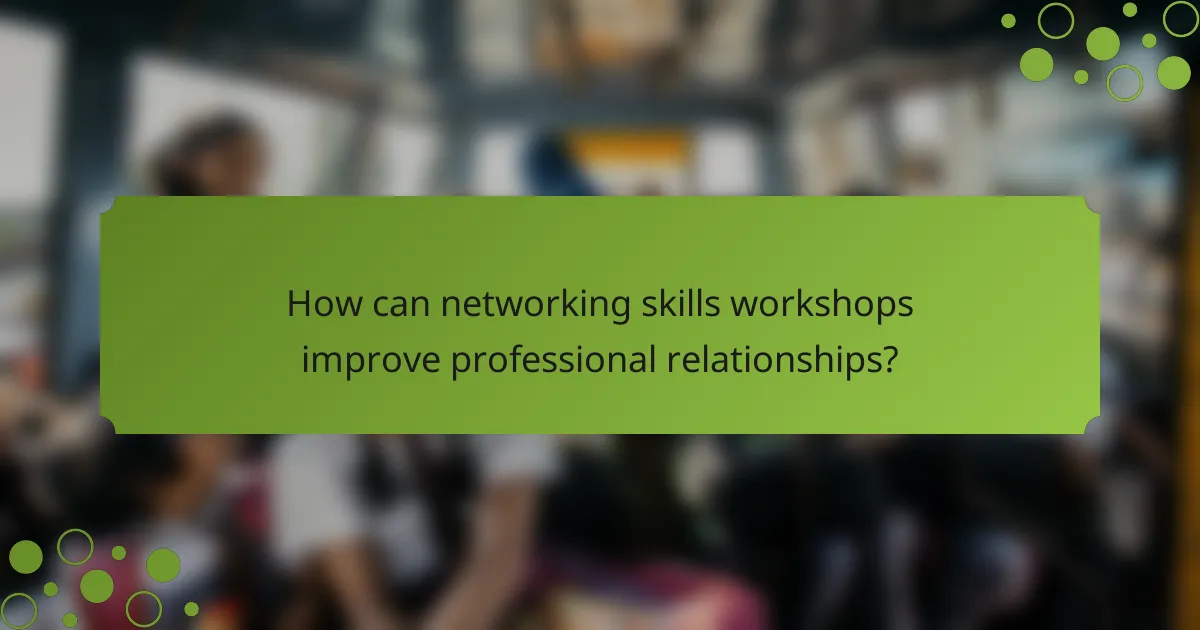
How can networking skills workshops improve professional relationships?
Networking skills workshops enhance professional relationships by equipping participants with essential communication techniques and confidence-building strategies. These workshops foster an environment where individuals can practice and refine their interpersonal skills, leading to more meaningful connections in their careers.
Enhanced interpersonal skills
Workshops focused on networking often include exercises that improve interpersonal skills such as active listening, body language awareness, and verbal communication. Participants learn to engage effectively with others, making conversations more impactful and memorable.
Role-playing scenarios can help individuals practice these skills in a safe setting, allowing them to receive feedback and make adjustments. This practice can significantly boost their confidence in real-world networking situations.
Building trust and rapport
Trust and rapport are critical components of successful professional relationships. Networking skills workshops teach techniques for establishing trust, such as being authentic, showing empathy, and maintaining consistency in interactions.
Participants can learn to share personal stories and experiences, which can help create a connection with others. Engaging in small group discussions allows individuals to practice building rapport in a supportive environment.
Expanding professional networks
Networking skills workshops provide opportunities for participants to meet and connect with a diverse group of professionals. This exposure can lead to new contacts and potential collaborations that may not have been possible otherwise.
Attendees are often encouraged to exchange contact information and follow up after the workshop, which can help solidify these new connections. Utilizing social media platforms like LinkedIn can further enhance their ability to expand their professional networks beyond the workshop setting.
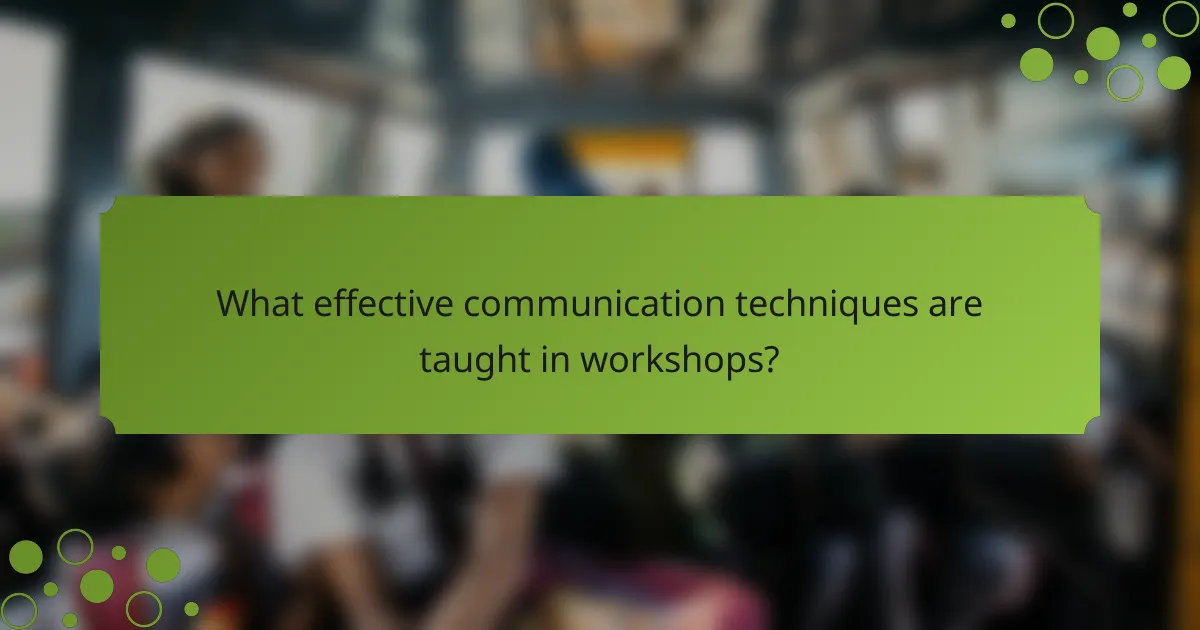
What effective communication techniques are taught in workshops?
Workshops on effective communication teach participants essential techniques to enhance their interpersonal skills. These techniques focus on improving clarity, fostering understanding, and building stronger professional relationships.
Active listening strategies
Active listening involves fully concentrating, understanding, and responding to what is being said. Participants learn to engage with speakers by nodding, maintaining eye contact, and summarizing key points to confirm understanding. This technique helps to create a supportive environment where all parties feel valued.
To practice active listening, avoid interrupting the speaker and refrain from formulating your response while they are talking. Instead, focus on their message and ask clarifying questions to deepen your comprehension.
Non-verbal communication skills
Non-verbal communication encompasses body language, facial expressions, and gestures, which can significantly impact how messages are received. Workshops often highlight the importance of aligning verbal and non-verbal cues to convey sincerity and confidence.
For example, maintaining an open posture and using appropriate facial expressions can enhance engagement during conversations. Participants are encouraged to be aware of their own body language and to interpret others’ non-verbal signals accurately.
Clear and concise messaging
Clear and concise messaging is crucial for effective communication, ensuring that the intended message is easily understood. Workshops teach participants to organize their thoughts and express them in a straightforward manner, avoiding jargon and unnecessary complexity.
To achieve clarity, use simple language and structure your messages logically. Consider using bullet points for lists or key takeaways to enhance readability. Practicing brevity helps in maintaining the listener’s attention and improving overall communication effectiveness.
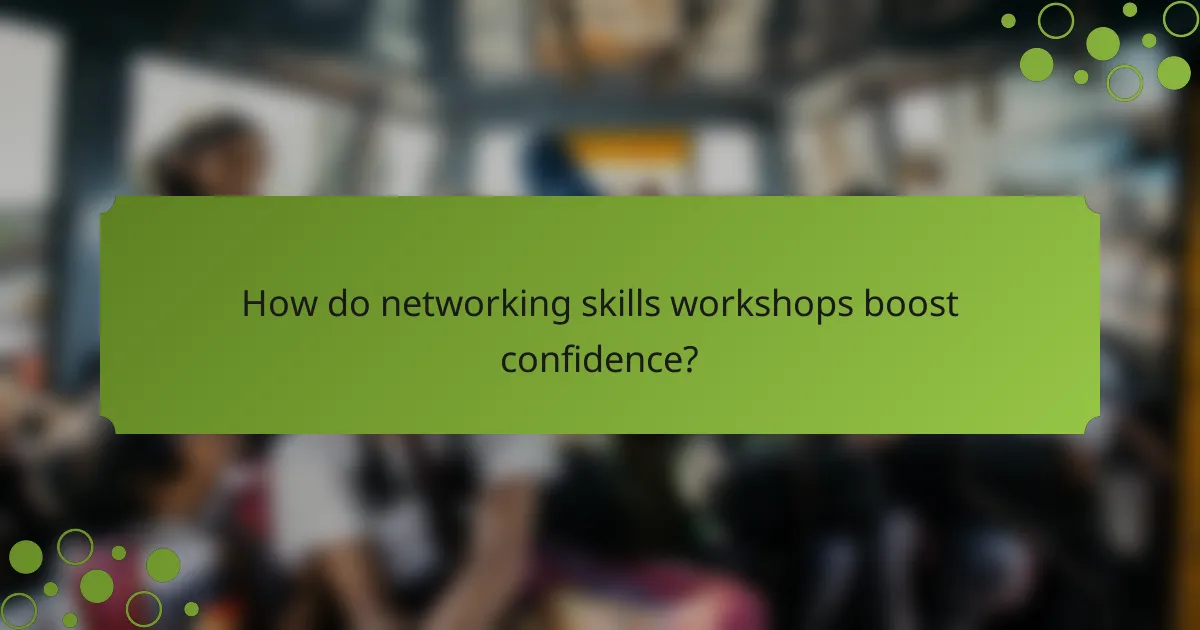
How do networking skills workshops boost confidence?
Networking skills workshops enhance confidence by providing participants with practical tools and techniques to engage effectively with others. These workshops create a supportive environment where individuals can practice their communication skills and receive constructive feedback.
Overcoming social anxiety
Networking skills workshops help participants confront and reduce social anxiety by encouraging gradual exposure to social situations. By engaging in structured activities, individuals learn to manage their fears in a controlled setting, which can lead to increased comfort in real-world interactions.
Techniques such as mindfulness and breathing exercises are often incorporated to help participants remain calm. Practicing small talk and initiating conversations in a safe environment can significantly diminish feelings of anxiety over time.
Role-playing scenarios
Role-playing scenarios are a key component of networking skills workshops, allowing participants to simulate real-life interactions. These exercises enable individuals to practice their communication skills, such as active listening and assertiveness, in a low-pressure setting.
Participants can take on different roles, which helps them understand various perspectives and improve their adaptability. This practice not only builds confidence but also prepares individuals for unexpected situations they may encounter in professional settings.
Positive feedback mechanisms
Positive feedback mechanisms are integral to boosting confidence in networking workshops. Participants receive constructive criticism and encouragement from peers and facilitators, which reinforces their strengths and highlights areas for improvement.
Creating a culture of support encourages individuals to step out of their comfort zones. Regularly acknowledging progress, no matter how small, helps build a positive self-image and motivates continued growth in networking abilities.
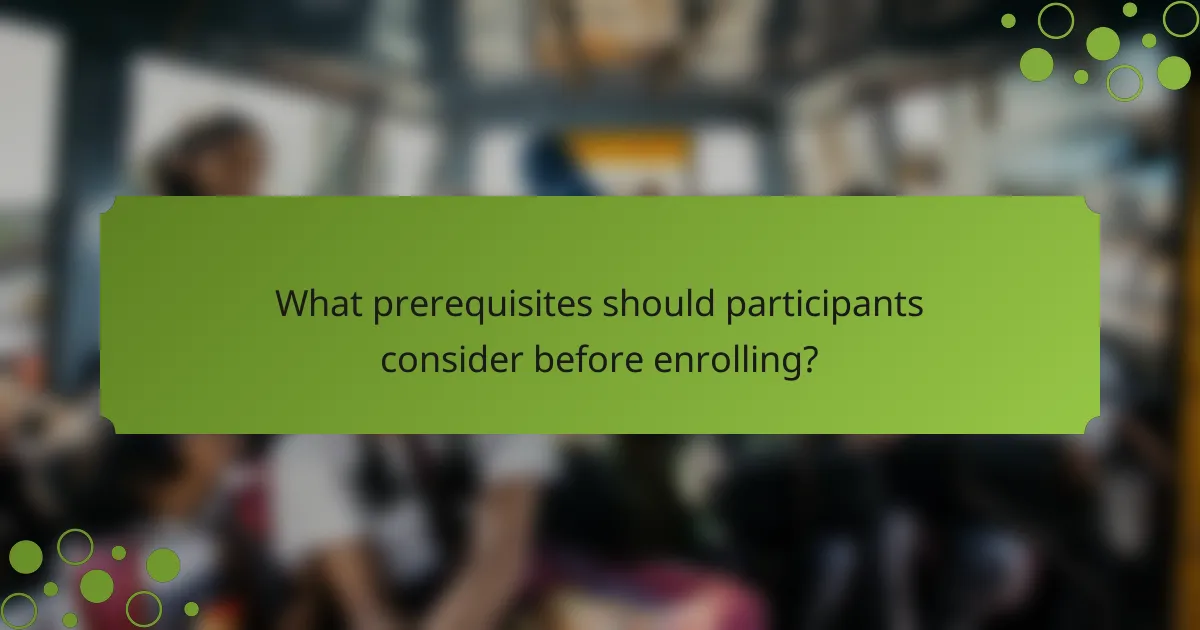
What prerequisites should participants consider before enrolling?
Before enrolling in networking skills workshops, participants should assess their current communication abilities and readiness to interact with others. Having a foundational understanding of basic communication skills and a willingness to engage with peers can significantly enhance the workshop experience.
Basic communication skills
Basic communication skills are essential for effective networking. Participants should be comfortable with verbal and non-verbal communication, including active listening, clear articulation of thoughts, and appropriate body language. These skills help in establishing rapport and conveying messages effectively.
To improve basic communication skills, consider practicing in low-pressure environments, such as casual conversations with friends or family. Engaging in activities like public speaking or joining a local Toastmasters club can also build confidence and proficiency.
Willingness to engage
A willingness to engage is crucial for making meaningful connections during networking workshops. This involves being open to meeting new people, sharing experiences, and participating in discussions. An enthusiastic attitude can foster a positive environment and encourage collaboration among participants.
To cultivate a willingness to engage, set personal goals for each networking event, such as initiating conversations with a specific number of attendees. Remember to approach interactions with curiosity and an open mind, which can lead to unexpected opportunities and insights.

Which online platforms offer networking skills workshops?
Several online platforms provide networking skills workshops that focus on building professional relationships, enhancing effective communication, and boosting confidence. These platforms offer a variety of courses tailored to different skill levels and professional needs.
LinkedIn Learning
LinkedIn Learning offers a wide range of courses specifically designed to improve networking skills. Users can access video tutorials that cover topics such as effective communication strategies, relationship building, and confidence enhancement in professional settings.
Courses are often taught by industry experts and can be completed at your own pace. Membership typically costs around $30 per month, with a free trial available for new users, allowing you to explore the content before committing.
Coursera
Coursera partners with universities and organizations to provide comprehensive networking skills workshops. These courses often include interactive elements, such as peer reviews and discussion forums, which can enhance learning through real-world applications.
Pricing varies depending on the course, with many offering financial aid options. Courses can range from free access to full specializations costing several hundred dollars, making it accessible for different budgets.
Udemy
Udemy features a diverse selection of networking skills workshops that cater to various learning preferences. Users can choose from courses focusing on specific aspects of networking, such as building confidence or mastering communication techniques.
Prices on Udemy are typically lower, often ranging from $10 to $50 per course, especially during sales. Once purchased, courses are available for lifetime access, allowing learners to revisit materials as needed.


